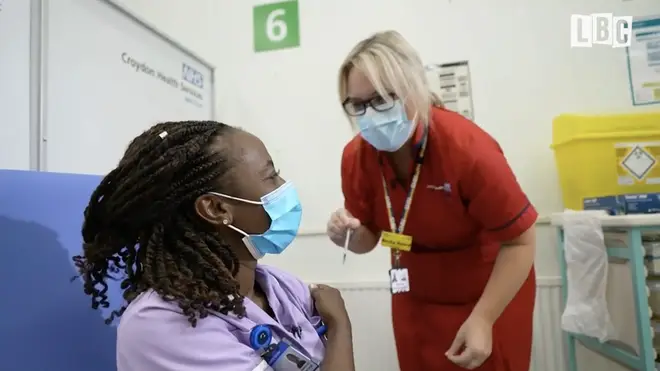
Richard Spurr 1am - 4am
16 September 2021, 15:04

A maternity support worker has spoken of her joy after becoming one of the first people in the UK to receive a Covid-19 booster jab.
Catherine Cargill, who works at Croydon University Hospital in south London, said the vaccination means she can carry on working, studying and spending time with her family.
"I've just had my booster vaccine, my Pfizer vaccine, and I have had it ahead of the winter season to make sure I am protected, to make sure I can carry on working, I can carry on spending time with my family, and so I can carry on with my studies," said Ms Cargill.
"I would definitely want to encourage you to get your booster shot when you are invited to do that."
Read more: Emma Raducanu REUNITED with parents after HISTORIC US Open win
Read more: Cladding CRISIS: Exhausted leaseholders to protest outside Parliament TODAY

first covid booster jabs given.mp4
The NHS in England officially launched its coronavirus booster programme on Thursday.
The programme will begin in hospitals, but GP-led local vaccination services will follow in the coming days and more vaccination centres and pharmacy-led sites will begin next week.
It will see millions of eligible people - including frontline NHS and social care stuff, anyone aged over 50 and younger people with underlying health conditions - offered a Pfizer vaccine, or in some cases a half-dose of Moderna.
This will be the case even if they originally received AstraZeneca.
It is likely people will be offered their booster jab in the same order of priority as they did during the initial vaccination campaign at the beginning of the year.
Read more: 'STAB IN THE BACK': French FURIOUS and China warns of ARMS RACE over nuclear pact
Read more: Sympathetic cops were TOO SLOW to clear off M25 eco-mob, minister suggests
In many cases GPs will may offer the winter flu jab to people at the same time, but if there are supply issues - which there have been in recent weeks - they have been told they should not hold up administering either vaccination.

Vallance explains reasoning behind offering booster jabs
People will receive their booster jabs at least six months after they got their second vaccine, in line with guidance from the Joint Committee on Vaccination and Immunisation (JCVI).
NHS England said people should wait to be contacted via a call or text from their GP or from the National Booking Service, which will start issuing invitations from next week.
"Now that the decision has been taken by the JCVI, and once the relevant checks are in place, the NHS will invite you for your booster vaccination," said Dr Nikki Kanani, GP and deputy lead for the Covid vaccination programme.
"There is no need to contact the NHS - we will be in touch with you when it is your turn to get your booster vaccine - at least six months on since your last dose."
Read more: All-civilian rocket crew TAKES OFF on SpaceX mission to orbit Earth
Read more: Get ready for a GENERAL ELECTION, new Tory boss tells party after BRUTAL reshuffle
She added: "Getting the vaccine remains the best way to protect yourself and those around you from Covid - so please do come forward for this top-up of protection when you are invited."
Health and Social Care Secretary Sajid Javid said: "It is brilliant to see that the first booster jabs are being rolled out today - thanks to the phenomenal efforts of the NHS who continue to work tirelessly to help us fight Covid-19 and protect the most vulnerable.
"We know vaccines save lives and, with every jab, our wall of defence across the country gets higher, with more than 112,300 lives saved and over 24 million cases prevented in England alone.
"I urge everyone who is eligible to come forward for their booster when invited, to prolong the protection that the vaccine offers those most at risk as we approach the winter months."